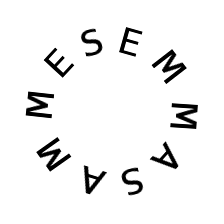misopedia
n. dislike of children
Language
Two Logos in One

The New Zealand property management company Emma Sammes has a curious claim to fame — if its name is laid out in a circle, it can be read both clockwise and counterclockwise.
British actress Emma Samms can almost claim the same distinction — but for one E.
In a Word
knickknackatory
n. a collection of knickknacks
A tongue twister: Bluebeard brought back black bric-a-brac.
Misc
- Can one keep a promise unintentionally?
- The plural of u is us.
- 1676 = 11 + 62 + 73 + 64
- DISMANTLEMENT and SKEPTICISM are typed with alternating hands.
- “He was lucky and he knew it.” — Clark Gable’s proposed epitaph
Riddle
What is shorter when it is longer and longer when it is shorter; also bigger when it is smaller and smaller when it is bigger?
A word. LONGER is shorter than SHORTER, and SMALLER is bigger than BIGGER.
Richard Lederer and Gary Hallock devised this puzzling sentence, which is best read aloud:
What is a four-letter word for a three-letter word which has five letters yet is still spelled with three letters, while it has only two and rarely has six and never is spelled with five?
It’s not a question, but a statement. Capitalize WHAT, FOR, WHICH, YET, IT, RARELY, and NEVER.
Name and Rank
The New York Times of Sept. 18, 1972, reported that a man named Minor W. Major attended a historical conference in Tarrytown, N.Y. Asked how he got his name, he said, “Before the Civil War, a young woman named Minor married a young man named Major and became Mrs. Major. He was a Confederate agent, and he sank Union shipments on the Mississippi. He had a Yankee uniform for use at certain times, and in those circumstances Minor Major, the Confederate agent, became Major Minor, a Union officer. I’m a great-grandson of the Major who married Miss Minor.”
In a Word
mussitate
v. to mutter under one’s breath
Misc
- Cain killed a quarter of the world’s population.
- Spencer Tracy’s 1937 Oscar was engraved DICK TRACY.
- 15626 = 1 + 56×2-6
- NINE TEN ELEVEN alternates vowels and consonants.
- “Can you play chess without the queen?” — Wittgenstein
Home Tune
It’s said that when Gustave Doré bought a villa on the outskirts of Paris, he had this notation inscribed over the entrance:

Do mi si la do re = “Domicile à Doré.” Get it?
Longfellow wrote, “Music is the universal language of mankind.”
In a Word
horrisonous
adj. uttering a terrible sound
